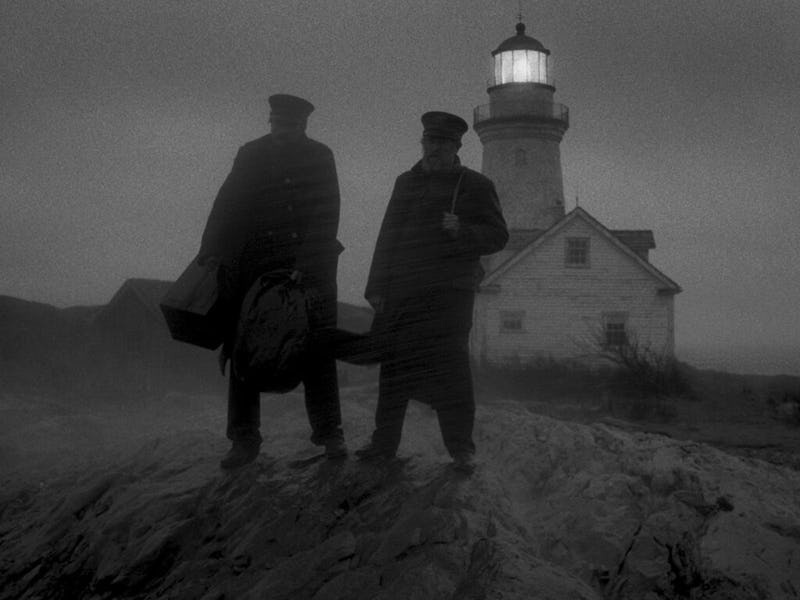The Lighthouse Might Be The Best Story H.P. Lovecraft Never Wrote
Mind the deep end.

Problematic as his views are today, H.P. Lovecraft is still regarded as one of the giants of horror literature, and his stories have been finding their way to the big screen for decades. But equally interesting are the Lovecraft-adjacent works, movies clearly influenced by his vision of an indifferent universe full of monstrous entities, yet not specifically based on anything the man wrote. John Carpenter, for example, has mined this territory with films like The Thing (1982) and In the Mouth of Madness (1995), while Lovecraft Country addressed Lovecraft’s racism within the context of the cosmic horror he made famous.
One of the best films to derive inspiration from Lovecraft’s work is The Lighthouse, directed by Robert Eggers from a script by Eggers and his brother Max, and released on October 18, 2019. The siblings had discussed the idea around the time Robert was seeking funding for his stunning 2016 folk-horror debut, The Witch, with its success allowing them to finally move forward.
The Lighthouse was initially inspired by an unfinished story fragment, “The Light-House,” by that other early titan of horror and mystery, Edgar Allan Poe. Aside from the title and bleak setting, however, The Lighthouse doesn’t really have any connections to Poe’s tale. As the film opens sometime during the 1890s, two lighthouse keepers arrive on a desolate island off the coast of New England for a four-week tour of duty.
Thomas Wake (Willem Dafoe), a crusty, short-tempered, hard-drinking ex-sailor, is the senior of the two, while the quiet, tightly-wound Ephraim Winslow (Robert Pattinson) is new to the job. He gets to do all the heavy labor, from emptying the pair’s chamber pots to pushing wheelbarrows full of coal across the rocky island, while Wake keeps watch in the lantern room at the top of the lighthouse every night (a job he mostly seems to do naked, as Winslow observes) and refuses to let Winslow up.
The men soon settle into a guarded working relationship, but Winslow begins to experience strange occurrences and hallucinations, including being attacked by a one-eyed seagull and glimpsing a mermaid washed up on the rocks. After he slays the seagull, which Wake has forbidden because of a legend that says they’re the reincarnations of sailors lost at sea, the island is beset by a massive storm that prevents the ship meant to relieve them from arriving. From there, the isolated pair descends into a vortex of drunken madness, sexual tension, and possibly supernatural torment.
Filmed in stark black and white and shot with vintage lenses in a square, claustrophobic screen ratio, The Lighthouse immediately immerses you in both its period details and the terrible beauty of its forsaken setting. We see literally nothing past the rocky shoreline, the ocean, and the fog; the rest of the world might as well not exist. The forbidding locale, late 19th-century milieu, and shared psychological collapse are aspects of not just Poe’s work, but are standard elements of the era’s Gothic literature, and Eggers uses them to full effect.
The facial hair also feels appropriate.
It’s the more mythic and cosmic aspects that are overtly Lovecraftian, along with the constant stream of ichorous fluids, putrefying bodies, barely glimpsed tentacular horrors, panicked sexual tension, and allusions to gods of the sea, where many of Lovecraft’s Elder Gods slumbered. Some of these merge, as when Pattinson’s Winslow (whose real name, it turns out, is also Thomas, adding the loss of identity to the thematic morass) hallucinates himself beating Dafoe’s Thomas Wake, only for the latter to morph into the Greek sea god Proteus. And then there’s the lantern atop the lighthouse, which will likely remind horror veterans of the “unnatural light” of Lovecraft’s “The Colour Out of Space” or the “deadlights” from Stephen King’s It.
There’s a lot going on under the hood of The Lighthouse; in addition to Poe and Lovecraft, Robert Eggers has cited authors like Herman Melville and Sarah Orne Jewett, along with playwrights such as Samuel Beckett and Harold Pinter, as instrumental to the film’s flavor and mood. Yet as an original psychological horror in which reality itself is besieged by unseen forces, it remains a Lovecraftian tone poem, an oppressive yet cosmic study of madness, desire, and ancient terror that, minus the author’s more noxious tendencies, could fit easily alongside his best works.